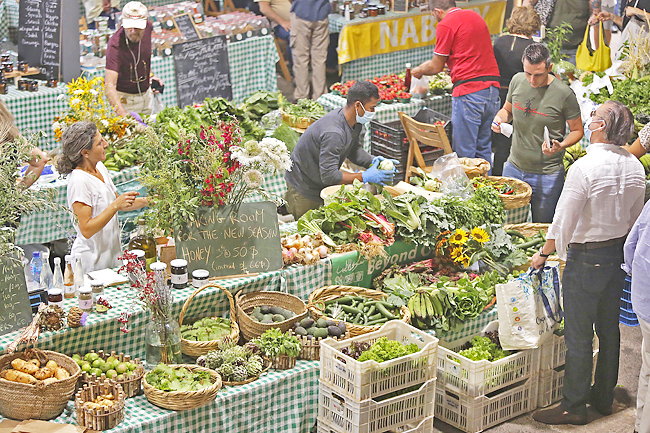Dana Halawi
BEIRUT (XINHUA) – Dozens of Lebanese smallholders and producers of homemade products gather every Saturday at Souk el Tayeb, the longest-running farmers’ market in Mar Mikhael, a vibrant neighbourhood in Beirut, hoping to clinch a fair deal despite the country’s current crisis.
Souk el Tayeb, which means a market for delicious food in English, was set up in 2004 to give small-scale farmers more than just a place to sell their products, said founder Kamal Mouzawak.
“It encouraged cultural exchange, serving as a platform for people and local communities to share food, traditions, and conversation,” he told Xinhua.
“During a time when people were just recovering from a 15-year civil war, this market held unique and special importance, as it brought fractured communities together, encouraging Lebanese to work side-by-side once again,” he noted, referring to the country’s post-civil war recovery since 1990.
Yasmina Zahar from Deir Mkhalles, an alpine village an hour drive south of downtown Beirut, has been vending at Souk el Tayeb for most weekends.
“I have been taking part in this project for around five years and I love it. There is a social mix that you don’t see in other places,” Zahar told Xinhua.

Despite a decline in sales after the crisis, Zahar favours the market for its values and principles which encourage purchasing locally grown foods to help preserve traditional farming and villages and revive agriculture as a whole at a difficult time.
Many farmers take pride in the organic produce that they brought to sale at the Souk el Tayeb market.
Mario Hakim, who owned farms in Nahr el Kalb, Rayfoun, Sannine and other areas in Lebanon, said he comes here every week to get in direct contact with customers who are interested in organic foods and willing to pay a good price for them.
Arranging his freshly produced cherries, strawberries and a variety of vegetables, farmer Joseph Boustani told Xinhua that the market gives him a good return from renting a stall at a modest price.
“We usually sell our products to restaurants, but the market here gives us exposure to different kinds of customers who have become accustomed to visiting this place every week to buy their needs,” Boustani said.
For his part, Hussein Kazoun, owner of Field to Fork, an organic farm distribution company, told Xinhua he was able to make good business on the farmers’ market, but his sales have dropped recently in light of the local currency collapse and the drop in purchasing power of the Lebanese people.
“We are still part of this project; we believe in its values and the great opportunity it gives to farmers,” Kazoun said.
Mouzawak told Xinhua that farmers rent a booth for a minimum fee of USD10, the total proceeds of which, together with the incomes from operating themed activities, would help the farmer’s market to pay its own rental fee.
Many activities aim to improve consumer access to the products of local farmers, cooks, and food companies, according to Mouzawak.






